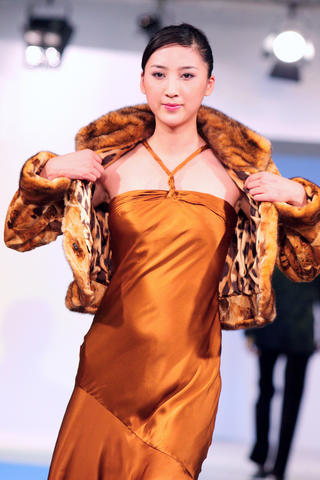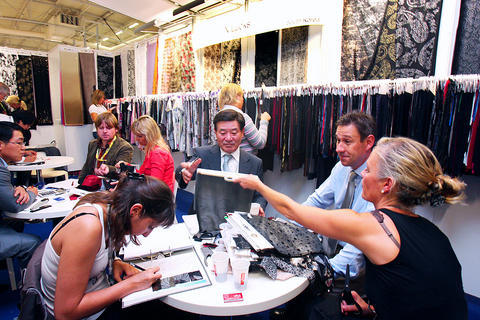With textile quotas about to expire, dozens of Chinese fashion firms are strutting their stuff jointly for the first time on Paris catwalks this week as Beijing attacks the high-end European market.
Making a debut appearance in the world's fashion capital, 82 clothing manufacturers from China descended on Paris for a four-day stint at a top trade fair, bringing their top models, including Miss Chinas 2003 and 2006, as well as the country's "most handsome man several years running," Zhang Xinghe.
From titillating G-string underwear to body-hugging evening gowns and trendy urban wear, 11 up-market labels were represented on the catwalk at the Texworld fabrics trade fair while dozens more showed cashmeres, fine silks and sportswear to 18,000 visiting buyers, some from France, the majority from across the continent.

PHOTO: AFP
"We must get to know each other better and reduce trade friction," said Du Yuzhou (杜鈺洲), head of the China National Textile and Apparel Council (CNTAC)."
Last October, China's Jefen fashion brand opened the march at the Paris women's ready-to-wear shows with a teen line of micro-bloomers and baby-doll dresses.
Speaking to reporters this week, Du said the country's fashion industry was putting the accent on producing high-end fashion apparel -- not the cheap-labor mass-produced gear generally associated with made-in-China goods.

PHOTO: AFP
"We are going upmarket, seeking not quantity but quality and innovation," he said. "We are looking at technological progress and creating labels. This will help encourage our companies to export."
The EU, whose quotas on Chinese textiles are finally to be dismantled at the end of the year, soaks up 15 percent of China's textile exports.
The country's 20 million textile workers produce US$561 billion turnover annually, a quarter for the export market.
"Textiles are of huge importance for our economy and for our export sector," Du said.
Star attraction at the fair, held on the eve of the Paris ready-to-wear shows, was what the Chinese call "soft gold" -- or cashmere.
"Our cashmere is the best in the world," proudly proclaimed Hei Liangjie, head of trade in the remote northern region of Ningxia bordering Mongolia, near the Gobi desert, whose six million people are mostly Muslim.
When cashmere prices rose steeply in the 1980s the region leapt in to consolidate its own raw material with raw cashmere purchased in Afghanistan, Pakistan, Iran and Mongolia, buying and selling at first before then realizing huge profits were to be made by also processing and producing cashmere goods.
Over time it has become the top producer of cashmere products in China, which itself accounts for 70 percent of global production.
Of the 20 million cashmere garments produced in Ningxia this year, 10 million were exported. One firm alone, Lingwu St Edenweiss, raises 350,000 goats a year.
"We are trying to develop our own labels aimed at the top-end market," Hei said. "The European market will be our biggest in the future."
Like cashmere, many of the Western-style products paraded on the catwalk boasted plus-size sales and production statistics.
Meters/bonwe, a late teens urban brand sporting skinny jeans and leather jackets, has 1,800 speciality stores in China. Smart Garments, which paraded evening furs and glittery get-up, produces more than a million pieces a year.
White Collar's smart evening wear reportedly receives 5,000 customers a day, and a flowing designer brand based on oriental trends called Exception de Mixmind has 60 outlets across China.
No wonder that the EU opted to extend textile quotas in 2005 -- exports of some items of Chinese clothing surged more than 500 percent when international quotas expired on Jan. 1, 2005.
"The levels of China textile exports following that liberalization were so great that EU companies did not have reasonable expectations of adjusting, hence the extension," a European Commission spokesman said.
"They will expire at the end of this year and they will not be replaced. We don't have the legal basis to replace them. The temporary extension was possible because when China entered the WTO in 2001 there was a clause in its agreement which enabled people to unilaterally re-impose quotas up until 2008," the spokesman said.
"In the end we didn't do it unilaterally, we negotiated it with China. But I don't imagine the Chinese are interested in renegotiating quotas and we are about to lose the main basis for unilaterally imposing quotas," he said.

CARROT AND STICK: While unrelenting in its military threats, China attracted nearly 40,000 Taiwanese to over 400 business events last year Nearly 40,000 Taiwanese last year joined industry events in China, such as conferences and trade fairs, supported by the Chinese government, a study showed yesterday, as Beijing ramps up a charm offensive toward Taipei alongside military pressure. China has long taken a carrot-and-stick approach to Taiwan, threatening it with the prospect of military action while reaching out to those it believes are amenable to Beijing’s point of view. Taiwanese security officials are wary of what they see as Beijing’s influence campaigns to sway public opinion after Taipei and Beijing gradually resumed travel links halted by the COVID-19 pandemic, but the scale of

TRADE: A mandatory declaration of origin for manufactured goods bound for the US is to take effect on May 7 to block China from exploiting Taiwan’s trade channels All products manufactured in Taiwan and exported to the US must include a signed declaration of origin starting on May 7, the Bureau of Foreign Trade announced yesterday. US President Donald Trump on April 2 imposed a 32 percent tariff on imports from Taiwan, but one week later announced a 90-day pause on its implementation. However, a universal 10 percent tariff was immediately applied to most imports from around the world. On April 12, the Trump administration further exempted computers, smartphones and semiconductors from the new tariffs. In response, President William Lai’s (賴清德) administration has introduced a series of countermeasures to support affected

Pope Francis is be laid to rest on Saturday after lying in state for three days in St Peter’s Basilica, where the faithful are expected to flock to pay their respects to history’s first Latin American pontiff. The cardinals met yesterday in the Vatican’s synod hall to chart the next steps before a conclave begins to choose Francis’ successor, as condolences poured in from around the world. According to current norms, the conclave must begin between May 5 and 10. The cardinals set the funeral for Saturday at 10am in St Peter’s Square, to be celebrated by the dean of the College

CROSS-STRAIT: The vast majority of Taiwanese support maintaining the ‘status quo,’ while concern is rising about Beijing’s influence operations More than eight out of 10 Taiwanese reject Beijing’s “one country, two systems” framework for cross-strait relations, according to a survey released by the Mainland Affairs Council (MAC) on Thursday. The MAC’s latest quarterly survey found that 84.4 percent of respondents opposed Beijing’s “one country, two systems” formula for handling cross-strait relations — a figure consistent with past polling. Over the past three years, opposition to the framework has remained high, ranging from a low of 83.6 percent in April 2023 to a peak of 89.6 percent in April last year. In the most recent poll, 82.5 percent also rejected China’s